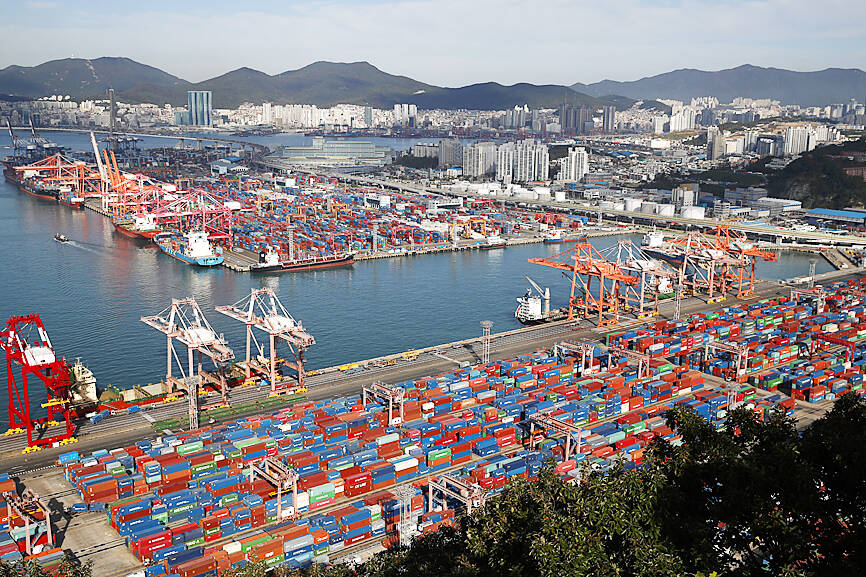South Korea plans on strengthening cooperation with India as Seoul attempts to align with a US-led push to diversify the global supply chain away from China.
“In the era of economic security, it is essential to strengthen supply chain and science and technology cooperation with India,” said South Korean Minister of Foreign Affairs Park Jin, who was on a two-day visit to India that began on Friday.
Park said India shares universal values such as democracy, possesses enormous growth potential and is a crucial partner for South Korea, the South Koran Ministry of Foreign Affairs said in a statement yesterday.

Photo: EPA-EFE
“Business entrepreneurs who are investing and operating in India must play a crucial role in realizing this,” Park told business leaders in Chennai.
In response, delegates highlighted the importance of fostering stronger human and cultural exchanges between the two countries to boost economic cooperation.
US President Joe Biden’s administration has been seeking help from allies, including South Korea, in reducing the global supply chain’s dependence on China, while also imposing sweeping curbs on the sale of advanced semiconductor equipment.
India has been one of the beneficiaries in the broader shift, as companies such as Apple Inc increase manufacturing capacity in the South Asian nation.
Separately, US Secretary of Commerce Gina Raimondo called on European governments to work with the US to fight climate change and counter Chinese clout, the latest sign that Washington hopes allies follow its lead in passing a landmark climate bill.
The US passage of the Inflation Reduction Act rankled European leaders, who complained that it was an unfair subsidy. The Biden administration has sought to soothe that angst, while signaling that Europe should match them rather than start a trade fight.
“We need to work together, and I think whether it’s the IRA or the chips initiative, there’s opportunities for European companies and opportunities for us to work together to meet the moment with climate change and our global competition with China,” Raimondo told Bloomberg Television on Friday. “So, initial hurt feelings, maybe. But there’s a lot of good work to do together.”
She said the US approach to China is to protect US technology and national security, while promoting exports of certain goods.
She also said the US is not looking to make all semiconductor chips on its own soil, but must rely less on Asia.
“Nobody thinks that we should be making everything that we need in America,” she said. “The fact that we buy 90-plus percent of our leading-edge chips from Taiwan is also unsustainable and, quite frankly, almost dangerous.”

CHIP WAR: Tariffs on Taiwanese chips would prompt companies to move their factories, but not necessarily to the US, unleashing a ‘global cross-sector tariff war’ US President Donald Trump would “shoot himself in the foot” if he follows through on his recent pledge to impose higher tariffs on Taiwanese and other foreign semiconductors entering the US, analysts said. Trump’s plans to raise tariffs on chips manufactured in Taiwan to as high as 100 percent would backfire, macroeconomist Henry Wu (吳嘉隆) said. He would “shoot himself in the foot,” Wu said on Saturday, as such economic measures would lead Taiwanese chip suppliers to pass on additional costs to their US clients and consumers, and ultimately cause another wave of inflation. Trump has claimed that Taiwan took up to

A start-up in Mexico is trying to help get a handle on one coastal city’s plastic waste problem by converting it into gasoline, diesel and other fuels. With less than 10 percent of the world’s plastics being recycled, Petgas’ idea is that rather than letting discarded plastic become waste, it can become productive again as fuel. Petgas developed a machine in the port city of Boca del Rio that uses pyrolysis, a thermodynamic process that heats plastics in the absence of oxygen, breaking it down to produce gasoline, diesel, kerosene, paraffin and coke. Petgas chief technology officer Carlos Parraguirre Diaz said that in

SUPPORT: The government said it would help firms deal with supply disruptions, after Trump signed orders imposing tariffs of 25 percent on imports from Canada and Mexico The government pledged to help companies with operations in Mexico, such as iPhone assembler Hon Hai Precision Industry Co (鴻海精密), also known as Foxconn Technology Group (富士康科技集團), shift production lines and investment if needed to deal with higher US tariffs. The Ministry of Economic Affairs yesterday announced measures to help local firms cope with the US tariff increases on Canada, Mexico, China and other potential areas. The ministry said that it would establish an investment and trade service center in the US to help Taiwanese firms assess the investment environment in different US states, plan supply chain relocation strategies and

Japan intends to closely monitor the impact on its currency of US President Donald Trump’s new tariffs and is worried about the international fallout from the trade imposts, Japanese Minister of Finance Katsunobu Kato said. “We need to carefully see how the exchange rate and other factors will be affected and what form US monetary policy will take in the future,” Kato said yesterday in an interview with Fuji Television. Japan is very concerned about how the tariffs might impact the global economy, he added. Kato spoke as nations and firms brace for potential repercussions after Trump unleashed the first salvo of